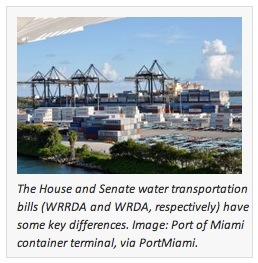 The Senate passed its version of a maritime transportation bill (WRDA) last May. The House begins debating its bill (WRRDA) today, so we don’t yet know what the final language will be. (To learn more, see our recent stories about WRRDA and WRDA.)
The Senate passed its version of a maritime transportation bill (WRDA) last May. The House begins debating its bill (WRRDA) today, so we don’t yet know what the final language will be. (To learn more, see our recent stories about WRRDA and WRDA.)
But based on the version coming to the House floor for debate, here are five key differences between the two proposals which have financial implications. The first four come courtesy of the Congressional Budget Office, in its Cost Estimate report (read full report here). The CBO is nonpartisan and produces “independent analyses of budgetary and economic issues to support the Congressional budget process.” The fifth difference is one we’ve written about before, and follow the CBO section.
“CBO estimated that implementing S. 601 would cost $5.7 billion over the 2014-2018 period. Significant differences between H.R. 3080 and S. 601:
H.R. 3080 would authorize four new projects that would not be authorized by S. 601.
Both H.R. 3080 and S. 601 would authorize the appropriation of more than $1 billion for the Olmsted navigation project in Illinois and Kentucky. The cost estimate for S. 601 that CBO prepared in April 2013 included the cost of this authorization. However, on October 17, 2013, an increase in the authorized cost for the Olmsted project was enacted by Public Law 113-46. As a result, CBO did not include any additional authorization cost for the Olmsted project in the cost estimate for H.R. 3080.
S. 601 would authorize the Corps to establish grant programs to assist local and state governments with levee safety; CBO estimates that program would cost $230 million over the 2014-2018 period. H.R. 3080 would authorize the Corps to provide technical and planning assistance but does not include grants to provide financial assistance to state and local governments. CBO estimates that this provision would cost $50 million over the 2014-2018 period.
S. 601 includes a loan guarantee program for state and local governments and certain nongovernmental entities to complete water infrastructure projects that is not included in H.R. 3080. CBO estimates that loan guarantee program would cost $40 million over the 2014-2018 period.”
Here’s another key difference which CBO didn’t discuss. It could become one of the more difficult issues for Senate and House negotiators to resolve.
The Senate version automatically authorizes projects that meet a certain set of criteria. But projects would still be selected by the Army Corps, and that’s going to be a problem for most House Republicans. (Learn more about the Senate bill at this GovTrack.us webpage and from our story, “Senate Committee Approves Ports, Harbors Investment Bill.”)
It sounds like the House proposal would take the same approach, but send the project list back to Congress for review and approval. It may take that for the bill to become law (that is, for the House to pass a bill), and the Senate may go for it, but it sounds like a recipe for eventual Congressional gridlock on project selection.
…
Larry Ehl is the founder and publisher of Transportation Issues Daily. In the public sector, Larry was Federal Relations Manager for Washington State DOT; Chief of Staff to US Senator Slade Gorton; and was twice elected to the Edmonds School Board.
Tags: CBO, Congressional Budget Office, House of Representatives, Larry Ehl, Senate, Transportation Issues Daily, WRDA, WRRDA






 RSS Feed
RSS Feed